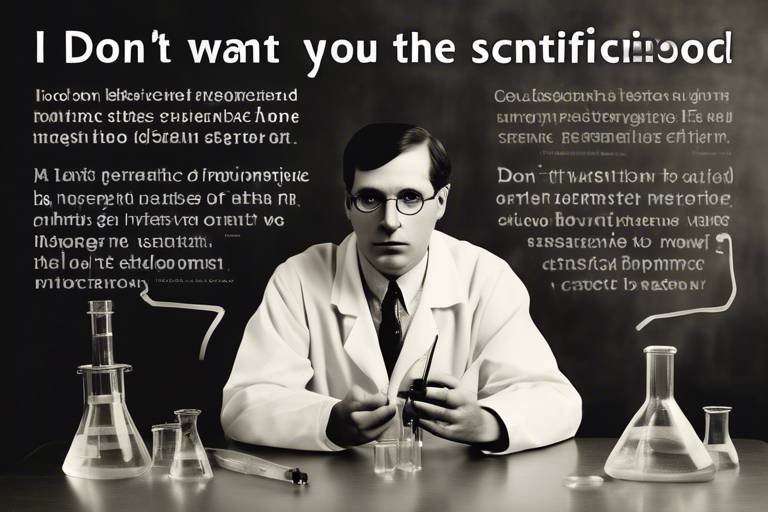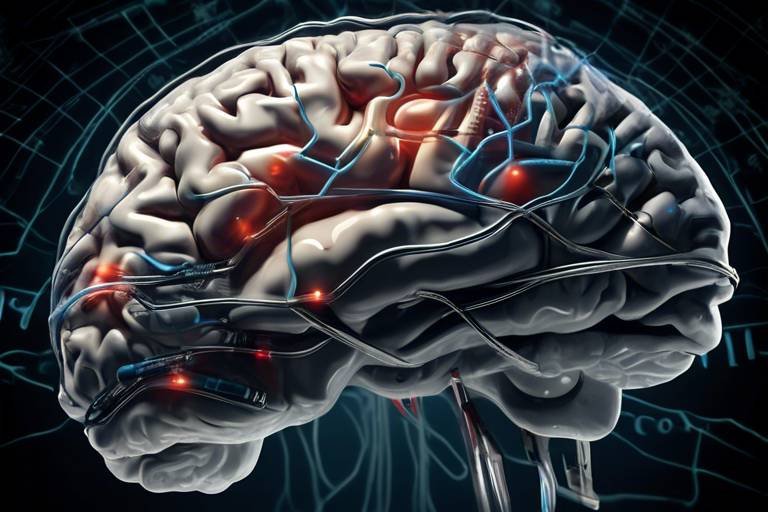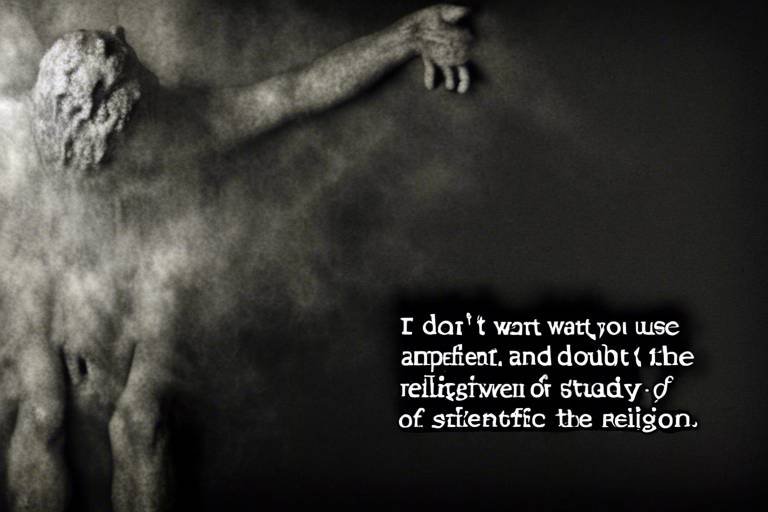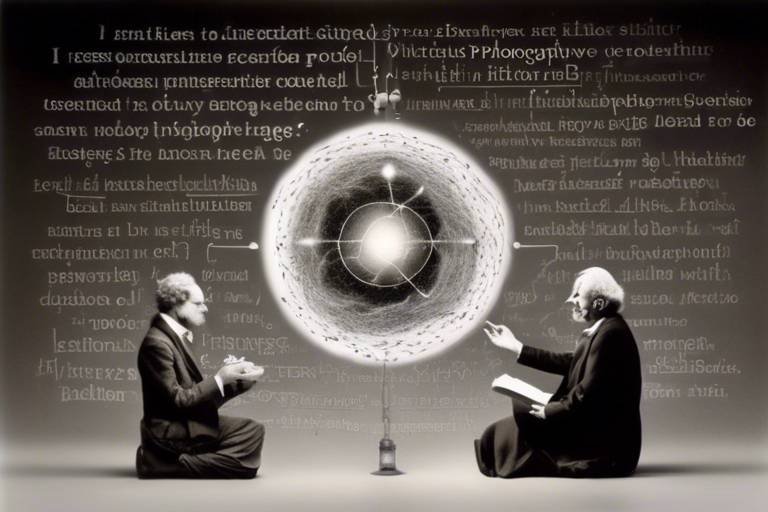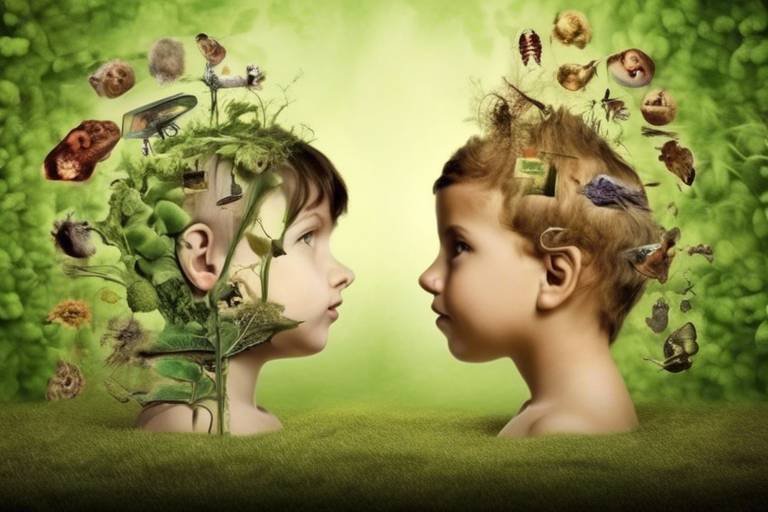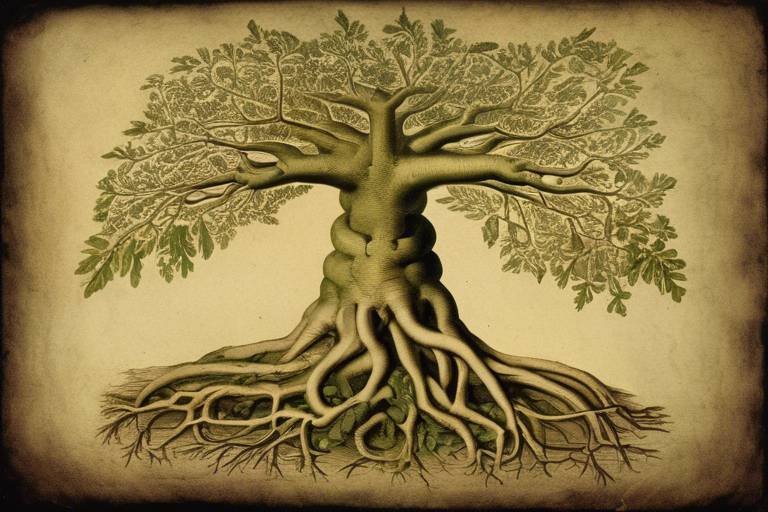Psychology and Morality - Where Do They Intersect?
The intricate dance between psychology and morality is a fascinating subject that has intrigued scholars, philosophers, and everyday individuals alike. At first glance, the two might seem like separate realms—psychology, the study of the mind and behavior, and morality, the principles concerning the distinction between right and wrong. However, dig a little deeper, and you'll discover that they are intricately woven together, influencing how we make decisions, how we perceive ethical dilemmas, and how we interact with one another in society.
Imagine you're faced with a moral dilemma: a friend has stolen something, and you're torn between loyalty and the ethical obligation to report the theft. Your emotions, shaped by psychological processes, will guide your decision. This is where the intersection of psychology and morality becomes evident. Our emotions, cognitive processes, and the social environment all play pivotal roles in how we navigate moral landscapes. Understanding this relationship can help us comprehend not just our own moral choices but also the ethical behavior of those around us.
Furthermore, the context in which we find ourselves often dictates our moral judgments. For example, in a group setting, social norms can exert a powerful influence on what we deem acceptable or unacceptable behavior. This highlights the importance of recognizing that morality is not merely an individual construct but is also shaped by the collective beliefs and values of society. As we explore the various dimensions of this relationship, it becomes clear that psychology is not just a backdrop to morality; it is an essential component that helps us understand the complexities of ethical behavior.
As we delve into the foundations of moral psychology, we will uncover how our emotional responses, cognitive dissonance, and social influences converge to form our moral frameworks. The journey through this intersection is not only enlightening but also crucial for fostering a more compassionate and ethically aware society.
Understanding the basic principles of moral psychology helps us grasp how emotions, cognition, and social influences shape our moral judgments and ethical behaviors. At its core, moral psychology examines the psychological mechanisms that underlie our moral decisions. This field explores questions like: What drives us to act ethically? How do our backgrounds and experiences shape our moral compass? By answering these questions, we can better understand the complexities of human behavior.
Emotions play a crucial role in moral decision-making, often guiding our judgments and influencing our perceptions of right and wrong in various situations. For instance, feelings of empathy can compel us to help others, while feelings of guilt can motivate us to correct our wrongs. These emotional responses are not just fleeting feelings; they are deeply rooted in our psychological makeup and can significantly impact our moral choices.
Cognitive dissonance occurs when our beliefs and actions conflict, leading to a reevaluation of our moral standards and behaviors to restore harmony. For example, if you believe in honesty but find yourself lying to avoid conflict, this dissonance can create discomfort. To alleviate this discomfort, you might change your beliefs about the importance of honesty or adjust your behavior to align more closely with your values.
Guilt serves as a powerful motivator for moral behavior, prompting individuals to rectify wrongdoings and adhere to ethical standards. When we experience guilt, it often pushes us to make amends, whether through apologies or corrective actions. This emotional response not only helps to restore our sense of self but also reinforces societal norms about responsibility and accountability.
Empathy fosters understanding and compassion, encouraging prosocial behavior and influencing moral decisions by allowing individuals to connect with others' experiences. When we can put ourselves in someone else's shoes, we are more likely to act in ways that align with moral principles. This connection is vital in creating a more empathetic society where individuals are motivated to act ethically.
Social norms and cultural contexts significantly shape our moral judgments, highlighting the importance of societal influences in ethical decision-making processes. It's fascinating to consider how what is deemed "right" or "wrong" can vary dramatically from one culture to another. This variability underscores the necessity of understanding the social frameworks that inform our moral beliefs.
Various theories of moral development, such as those proposed by Kohlberg and Gilligan, provide insight into how individuals evolve in their understanding of morality throughout their lives. These theories offer frameworks for understanding the stages of moral reasoning and the factors that contribute to moral growth.
Kohlberg's framework outlines six stages of moral reasoning, illustrating how individuals progress through different levels of ethical understanding and decision-making. From obedience to authority to the recognition of universal ethical principles, these stages highlight the complexity of moral reasoning and the development of a personal moral compass.
Gilligan's approach emphasizes the importance of relationships and care in moral reasoning, contrasting with traditional models that prioritize justice and rights. Her work challenges the conventional views of morality by highlighting how an ethic of care can lead to more compassionate and context-sensitive moral decisions.
- What is moral psychology? Moral psychology is a field that examines the psychological processes underlying moral judgments and behaviors.
- How do emotions affect moral decisions? Emotions like guilt and empathy significantly influence our moral choices, often guiding our perceptions of right and wrong.
- What are the main theories of moral development? Two prominent theories are Kohlberg's stages of moral development and Gilligan's ethics of care.
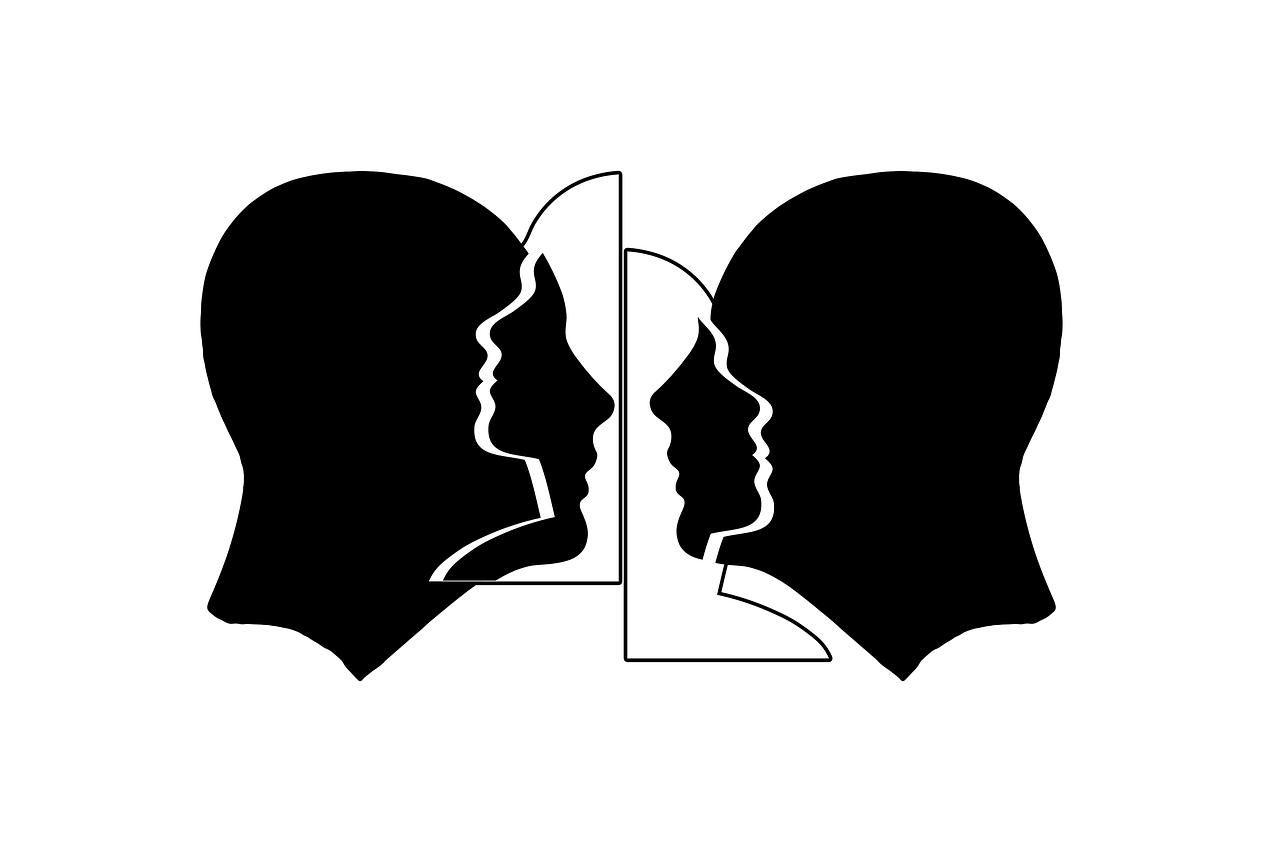
The Foundations of Moral Psychology
This article explores the complex relationship between psychology and morality, examining how psychological principles influence moral decision-making and ethical behavior in individuals and societies.
Understanding the basic principles of moral psychology helps us grasp how emotions, cognition, and social influences shape our moral judgments and ethical behaviors. At its core, moral psychology investigates the psychological processes that underlie our understanding of right and wrong. It is a fascinating blend of psychology and ethics, where both disciplines converge to explore the intricacies of human behavior.
One of the fundamental aspects of moral psychology is the role of cognitive processes. Our brains work tirelessly to interpret the world around us, and this includes our moral landscape. When faced with a moral dilemma, we often engage in a mental tug-of-war, weighing the consequences of our actions against our moral beliefs. This cognitive evaluation can lead to various outcomes, influencing whether we act in accordance with our ethical standards or stray from them.
Equally important are the emotional components of moral psychology. Emotions such as guilt, shame, and empathy are not just fleeting feelings; they are powerful forces that drive our moral decisions. For instance, when we feel guilty about a wrongdoing, it can propel us to make amends, thereby reinforcing our moral compass. Similarly, empathy allows us to step into someone else's shoes, fostering a deeper understanding of their plight and often guiding us toward more compassionate actions.
Moreover, the social context in which we operate plays a critical role in shaping our moral judgments. The norms and values of our communities can significantly influence our ethical decision-making processes. For example, what is considered morally acceptable in one culture may be deemed inappropriate in another. This cultural variability highlights the importance of examining morality not just as an individual trait but as a collective social construct.
In summary, the foundations of moral psychology are built upon a complex interplay of cognitive processes, emotional influences, and social contexts. Together, these elements create a rich tapestry that informs our understanding of morality and ethical behavior. As we delve deeper into this topic, we will uncover how these foundations manifest in our everyday lives and influence our moral decisions.
Emotions play a crucial role in moral decision-making, often guiding our judgments and influencing our perceptions of right and wrong in various situations.
Cognitive dissonance occurs when our beliefs and actions conflict, leading to a reevaluation of our moral standards and behaviors to restore harmony.
Guilt serves as a powerful motivator for moral behavior, prompting individuals to rectify wrongdoings and adhere to ethical standards.
Empathy fosters understanding and compassion, encouraging prosocial behavior and influencing moral decisions by allowing individuals to connect with others' experiences.
Social norms and cultural contexts significantly shape our moral judgments, highlighting the importance of societal influences in ethical decision-making processes.
Various theories of moral development, such as those proposed by Kohlberg and Gilligan, provide insight into how individuals evolve in their understanding of morality throughout their lives.
Kohlberg's framework outlines six stages of moral reasoning, illustrating how individuals progress through different levels of ethical understanding and decision-making.
Gilligan's approach emphasizes the importance of relationships and care in moral reasoning, contrasting with traditional models that prioritize justice and rights.
- What is moral psychology?
Moral psychology is the study of how psychological processes influence our understanding of morality and ethical behavior.
- How do emotions affect moral decisions?
Emotions like guilt and empathy play a significant role in guiding our moral judgments and actions.
- What are the main theories of moral development?
Key theories include Kohlberg's stages of moral development and Gilligan's ethics of care, each providing different perspectives on how we evolve morally.

The Role of Emotions in Moral Decisions
When it comes to making moral decisions, emotions are like the compass guiding us through the fog of ethical dilemmas. Have you ever felt a rush of anger when witnessing an injustice? That visceral reaction is a prime example of how our feelings can shape our moral landscape. Emotions such as guilt, empathy, and even fear play pivotal roles in how we perceive right and wrong, often overriding logical reasoning in the heat of the moment. In fact, research suggests that our emotional responses can be so powerful that they can lead us to make decisions that defy our rational self-interest.
For instance, consider a situation where you see someone being bullied. Your immediate emotional reaction might be one of outrage or sorrow, prompting you to intervene, even if it puts you at risk. This instinctual response is driven by a complex interplay of emotional and cognitive processes. Our brains are wired to respond to emotional stimuli, and when we witness suffering, our empathy kicks in, urging us to take action. This connection between emotion and moral decision-making is not just a fleeting phenomenon; it has deep roots in our psychology and social evolution.
Moreover, emotions serve as a feedback mechanism, helping us evaluate our actions in moral contexts. When we act in ways that align with our moral beliefs, we often feel a sense of pride or satisfaction. Conversely, when we stray from these beliefs, feelings of guilt can arise, compelling us to make amends. This cycle of emotional feedback reinforces our moral framework and encourages us to adhere to ethical standards. Isn't it fascinating how our emotional state can influence not just our decisions but also our moral identity?
To illustrate the importance of emotions in moral decisions, let’s delve into a few key emotional drivers:
- Guilt: Often described as a moral barometer, guilt can motivate individuals to correct their wrongs and strive for ethical behavior.
- Empathy: The ability to understand and share the feelings of others can lead to compassionate actions and promote prosocial behavior.
- Fear: Sometimes, fear of social repercussions or personal consequences can deter unethical behavior, showcasing how emotions can serve as a moral guide.
In sum, emotions are not just fleeting feelings; they are integral to our moral decision-making processes. They drive us to act, reflect, and ultimately shape our ethical perspectives. As we navigate through life, recognizing the power of our emotions can help us understand the complexities of our moral choices. So next time you find yourself faced with a moral dilemma, take a moment to check in with your emotions—after all, they might just be the key to unlocking the right decision.
- How do emotions influence moral decisions?
Emotions can drive our judgments and actions, often leading us to act in ways that align with our moral beliefs, even when logic suggests otherwise. - Can guilt lead to positive moral behavior?
Yes, guilt can motivate individuals to rectify their wrongdoings and adhere to ethical standards, serving as a powerful motivator for moral behavior. - What role does empathy play in morality?
Empathy fosters understanding and compassion, encouraging prosocial behavior and influencing moral decisions by allowing individuals to connect with others' experiences.

Cognitive Dissonance and Morality
Cognitive dissonance is a fascinating psychological phenomenon that occurs when our beliefs and actions are in conflict. Imagine you’re a passionate advocate for environmental conservation, yet you find yourself driving a gas-guzzling SUV. This internal conflict creates a mental discomfort that pushes you to reevaluate either your beliefs or your actions. It's like trying to fit a square peg into a round hole; something just doesn’t add up. This dissonance can lead to significant changes in how we perceive our moral standards and ethical behaviors.
When faced with cognitive dissonance, individuals often employ various strategies to resolve the discomfort. Some may choose to change their behavior to align with their beliefs, while others might alter their beliefs to justify their actions. For instance, the SUV owner might start emphasizing the importance of convenience over environmental impact, thus alleviating the mental strain. This adjustment can be troubling because it shows how easily we can manipulate our moral compass to avoid discomfort.
Research has shown that cognitive dissonance not only affects personal morality but can also influence larger societal norms. When groups or communities experience dissonance regarding a shared belief—such as the importance of honesty—individuals may either conform to the group's actions or challenge the group's ethics. This tug-of-war can lead to shifts in moral standards within the community, showcasing how interconnected our individual moral frameworks are with societal norms.
To illustrate this phenomenon, consider a table summarizing the common strategies people use to resolve cognitive dissonance in relation to morality:
| Strategy | Description |
|---|---|
| Change Behavior | Altering actions to align with beliefs (e.g., switching to a more eco-friendly vehicle). |
| Change Beliefs | Justifying actions by modifying beliefs (e.g., prioritizing convenience over environmental concerns). |
| Trivialization | Downplaying the importance of the conflict (e.g., convincing oneself that driving a gas-guzzler isn't that harmful). |
| Seeking Support | Finding others who share similar beliefs or actions to feel validated (e.g., joining a group that supports fossil fuel usage). |
Ultimately, cognitive dissonance serves as a powerful reminder of the complexity of our moral landscapes. It highlights that our ethical decisions are not always clear-cut but are influenced by a myriad of factors, including emotions, social pressures, and personal experiences. Recognizing this can lead to greater self-awareness and a more profound understanding of our motivations, paving the way for more authentic moral actions. So, the next time you find yourself in a moral quandary, consider the role of cognitive dissonance in shaping your decisions. It might just be the key to unlocking a deeper understanding of your own ethical beliefs.
- What is cognitive dissonance? Cognitive dissonance is the mental discomfort experienced when an individual holds two or more contradictory beliefs, values, or attitudes, especially in the context of behavioral decisions and attitude change.
- How does cognitive dissonance affect moral decision-making? It can lead individuals to either change their beliefs or behaviors to reduce the discomfort, which can ultimately influence their moral judgments and ethical standards.
- Can cognitive dissonance lead to positive changes? Yes, when individuals confront their dissonance, it can motivate them to align their actions with their moral beliefs, leading to personal growth and improved ethical behavior.

The Impact of Guilt on Behavior
Guilt is an emotion that many of us are all too familiar with. It creeps in like a shadow after we’ve made a mistake or hurt someone, and it can be a powerful force in shaping our behavior. But have you ever wondered why guilt has such a profound impact on our actions? It's not just a fleeting feeling; it can drive us to make amends, change our behavior, or even engage in altruistic acts. Think of guilt as a moral compass, guiding us back to our ethical path when we veer off course.
When we feel guilty, our minds often race with thoughts of how we’ve wronged someone or violated our own moral standards. This internal conflict can lead to a phenomenon known as cognitive dissonance, where our beliefs clash with our actions. To alleviate this discomfort, we may seek to rectify our mistakes or ensure that we don’t repeat the same errors. In essence, guilt pushes us to restore balance in our moral universe, and it can be a catalyst for personal growth and ethical behavior.
Consider this: when you feel guilty about not helping a friend in need, that nagging feeling can motivate you to reach out and offer assistance next time. Guilt, in this sense, acts as a teacher, instilling in us the lessons we need to become better individuals. It’s fascinating how an emotion that feels so uncomfortable can also lead to positive change. However, it's important to note that excessive guilt can be detrimental, leading to anxiety and depression. Striking a balance is key.
Moreover, guilt can also enhance our empathy towards others. When we acknowledge our wrongdoings, we often become more attuned to the feelings of those we’ve affected. This heightened empathy can foster a deeper understanding of others' experiences and struggles, encouraging us to act in more compassionate ways. For example, if you’ve hurt someone’s feelings, feeling guilty may lead you to apologize sincerely, reinforcing your relationship and promoting healing.
To illustrate the impact of guilt on behavior, let’s take a look at a simple table that outlines the potential outcomes of experiencing guilt:
| Outcome | Description |
|---|---|
| Rectification | Taking steps to correct a wrong action or behavior. |
| Altruism | Engaging in selfless acts to help others, often motivated by guilt. |
| Behavioral Change | Making conscious efforts to avoid repeating the same mistakes. |
| Emotional Distress | Experiencing anxiety or depression due to unresolved guilt. |
As we can see, guilt can lead to a variety of behaviors, some constructive and others potentially harmful. The key takeaway here is that guilt is not merely a negative feeling to be avoided; it can be a powerful motivator for change and improvement. By embracing guilt and understanding its role in our moral framework, we can harness its energy to foster positive actions and relationships.
- What is the difference between guilt and shame? Guilt focuses on the action ("I did something bad"), while shame focuses on the self ("I am bad").
- Can guilt ever be a positive emotion? Yes, guilt can motivate individuals to make amends and improve their behavior.
- How can I cope with excessive guilt? Seeking support from friends, family, or a therapist can help you process feelings of guilt in a healthy way.

Empathy's Influence on Morality
Empathy is like the glue that holds our moral compass together. It’s that innate ability to step into someone else's shoes, to feel their pain, joy, and everything in between. Think about it: when you see someone struggling, what’s the first thing that pops into your mind? Often, it’s a sense of connection, a desire to help. This emotional resonance is the bedrock of moral behavior. Without empathy, our moral judgments can seem cold and detached, like a robot calculating the pros and cons of a decision without any regard for human feelings.
When we empathize with others, we’re not just recognizing their emotions; we’re allowing those feelings to influence our actions. For instance, if you witness a friend in distress, your empathetic response might lead you to offer support or comfort. This is where empathy becomes a powerful motivator for moral behavior. It pushes us to act in ways that are beneficial to others, fostering a sense of community and shared humanity. In fact, research shows that individuals who score high on empathy scales are more likely to engage in prosocial behaviors, such as volunteering or helping those in need.
But let’s dig deeper. Have you ever noticed how empathy can vary from one culture to another? Social norms and cultural contexts can shape how we express and experience empathy. In some cultures, collective well-being is prioritized, leading to a stronger emphasis on community support and care. In contrast, individualistic societies might promote personal success, potentially diminishing the focus on empathetic connections. This cultural lens can significantly influence moral judgments and ethical behaviors.
Moreover, empathy isn't just a one-way street. It can create a ripple effect, encouraging others to act morally as well. When we witness acts of kindness fueled by empathy, it inspires us to follow suit. It’s like watching a chain reaction; one empathetic act can lead to another, creating a wave of positive behavior that can transform communities. This interconnectedness highlights the importance of empathy in moral decision-making and ethical behavior.
In summary, empathy is not merely a soft skill; it’s a fundamental aspect of our moral framework. It shapes our actions, influences our judgments, and connects us to one another in profound ways. By nurturing our empathetic abilities, we can enhance our moral reasoning and contribute to a more compassionate world. So, the next time you find yourself in a moral dilemma, ask yourself: how would I feel if I were in their position? This simple question can guide you toward a more empathetic and morally sound decision.
- What is empathy? Empathy is the ability to understand and share the feelings of others, allowing us to connect with their experiences.
- How does empathy influence moral behavior? Empathy motivates individuals to act in ways that are caring and supportive, fostering prosocial behaviors.
- Can empathy vary across cultures? Yes, cultural norms can shape how empathy is expressed and experienced, influencing moral judgments.
- Why is empathy important in society? Empathy promotes understanding, compassion, and community, which are essential for a harmonious society.

Social Influences on Moral Judgment
When we think about morality, it's easy to assume that our moral compass is purely an internal guide, shaped by our personal values and beliefs. However, the reality is far more complex. Social influences play a pivotal role in shaping our moral judgments. From the moment we are born, we are immersed in a world filled with social norms, cultural values, and expectations that continuously mold our understanding of right and wrong. Have you ever wondered how your friends or family might sway your moral decisions? This phenomenon is deeply rooted in psychology.
At the heart of this dynamic is the concept of social norms. These are the unwritten rules that govern behavior within a group. They dictate what is considered acceptable and unacceptable, often leading individuals to conform to the expectations of their peers. For example, if a group of friends believes that helping those in need is a moral obligation, an individual within that group is likely to adopt a similar view, even if they initially felt indifferent about the subject. This is because social approval can be a powerful motivator, pushing us to align our moral judgments with those of the people around us.
Moreover, our cultural context heavily influences our moral framework. Different cultures have varying beliefs about morality, which can lead to significant differences in moral judgments across societies. For instance, in collectivist cultures, the emphasis may be placed on community welfare and harmony, whereas individualist cultures might prioritize personal rights and freedoms. This divergence illustrates that morality is not a universal concept but rather a social construct that can shift based on cultural norms. Understanding these differences can help us navigate moral dilemmas in a diverse world.
Another aspect to consider is the role of authority figures. From parents to teachers, authority figures often set the moral standards that individuals adopt. When a child witnesses a parent demonstrating kindness or fairness, they are likely to internalize these behaviors as moral imperatives. However, what happens when authority figures model unethical behavior? This can lead to a troubling cycle where individuals justify immoral actions by citing the behavior of those in power. It raises the question: Are we truly moral agents, or are we merely products of our environment?
In addition to social norms and authority, peer pressure is a significant factor in moral decision-making. The desire to fit in can lead individuals to compromise their values, especially during adolescence when social acceptance is paramount. Imagine a scenario where a group of teenagers decides to cheat on a test. An individual may struggle with the decision but ultimately chooses to go along with the group, fearing ostracism. This illustrates how powerful social influences can override personal moral beliefs, highlighting the intricate dance between individual ethics and social conformity.
Ultimately, understanding the social influences on moral judgment opens up a broader conversation about ethics. It challenges us to reflect on our values and consider how much of our moral reasoning is truly our own. Are we simply echoing the beliefs of those around us, or are we engaging in genuine moral reflection? This awareness can empower us to make more conscious choices and strive for a moral compass that aligns with our authentic selves.
- What are social norms? Social norms are the unwritten rules that dictate acceptable behavior within a group or society.
- How do cultural differences affect morality? Different cultures have varying beliefs about morality, leading to different moral judgments and ethical standards.
- Can authority figures influence moral behavior? Yes, authority figures can set moral standards that individuals often adopt, impacting their ethical decisions.
- What role does peer pressure play in moral judgment? Peer pressure can lead individuals to conform to group norms, sometimes at the expense of their own moral beliefs.

Moral Development Theories
The study of moral development is a fascinating journey into how we, as individuals, come to understand and navigate the complexities of right and wrong throughout our lives. Various theories have emerged to explain this intricate process, with two of the most prominent being those proposed by Lawrence Kohlberg and Carol Gilligan. These theories not only highlight the evolution of moral reasoning but also reflect the diverse influences that shape our ethical frameworks. Understanding these theories can provide profound insights into our own moral compasses and how they guide our decisions.
Kohlberg's theory, for instance, is structured around a series of stages that individuals progress through as they develop their moral reasoning. He identified three main levels—pre-conventional, conventional, and post-conventional—each containing two stages. At the pre-conventional level, morality is primarily determined by the consequences of actions. For example, a child might obey rules to avoid punishment or to gain rewards. As individuals advance to the conventional level, their understanding of morality becomes more aligned with societal norms and the expectations of others. Finally, at the post-conventional level, individuals begin to form their own ethical principles, which may even challenge societal norms. This progression illustrates a journey from a self-centered view of morality to a more principled and universal approach.
On the other hand, Gilligan's ethics of care presents a contrasting perspective. While Kohlberg's theory emphasizes justice and rights, Gilligan argues that morality is deeply rooted in interpersonal relationships and the care we extend to others. Her research, primarily focused on women’s moral development, suggests that many individuals prioritize empathy and compassion over abstract principles of justice. This approach highlights the importance of context and relationships in moral reasoning, suggesting that our decisions are often influenced by our connections with others rather than solely by rules or laws.
| Theory | Key Focus | Stages/Levels |
|---|---|---|
| Kohlberg's Theory | Justice and Rights |
|
| Gilligan's Ethics of Care | Relationships and Care | Not stage-based, focuses on context |
Both theories provide valuable insights into the development of moral reasoning, yet they also raise important questions about the universality of moral principles. Are Kohlberg's stages applicable to everyone, or do they reflect a specific cultural perspective? Similarly, Gilligan's emphasis on care prompts us to consider how gender and relational dynamics influence our moral decisions. These questions underscore the importance of understanding moral development as a complex interplay of cognitive, emotional, and social factors.
In conclusion, the exploration of moral development theories not only enriches our understanding of how we make ethical decisions but also invites us to reflect on our own values and the influences that shape them. Whether we lean towards Kohlberg's structured stages of moral reasoning or Gilligan's relational ethics, the journey of moral development is a deeply personal and evolving experience that shapes who we are and how we interact with the world around us.
- What are the main stages of Kohlberg's moral development? Kohlberg identified three main levels: pre-conventional, conventional, and post-conventional, each containing two stages that reflect different approaches to moral reasoning.
- How does Gilligan's ethics of care differ from traditional moral theories? Gilligan emphasizes the importance of relationships and care in moral reasoning, contrasting with theories that prioritize justice and rights.
- Can moral development theories apply to all cultures? While these theories provide valuable frameworks, their applicability may vary across different cultural contexts and perspectives.

Kohlberg's Stages of Moral Development
Kohlberg's Stages of Moral Development offer a fascinating framework for understanding how our moral reasoning evolves as we grow. This theory, developed by psychologist Lawrence Kohlberg, outlines a series of six stages that individuals typically progress through, each representing a different level of ethical understanding. It's like climbing a ladder where each rung takes you higher, giving you a broader perspective on right and wrong. At each stage, individuals face moral dilemmas that challenge their existing beliefs and push them to rethink their values. The stages can be grouped into three main levels: pre-conventional, conventional, and post-conventional.
In the pre-conventional level, which typically characterizes children, moral reasoning is primarily based on the consequences of actions. For example, a child might decide not to steal a cookie because they fear punishment. As they grow, they enter the conventional level, where societal norms and the desire for approval from others guide their decisions. Here, individuals start to understand the importance of maintaining relationships and adhering to rules. They might think, "I shouldn't lie because it's wrong and people expect honesty." Finally, some individuals reach the post-conventional level, where they begin to question societal norms and develop their own ethical principles based on universal human rights and justice.
To better illustrate these stages, let’s break them down:
| Stage | Description | Example |
|---|---|---|
| 1. Obedience and Punishment Orientation | Morality is based on avoiding punishment. | A child avoids stealing a toy because they fear being scolded. |
| 2. Individualism and Exchange | Right actions are those that serve one's own interests. | A child shares toys with a friend to receive a favor in return. |
| 3. Good Interpersonal Relationships | Morality is about living up to social expectations and roles. | A teenager helps a classmate to be seen as a good person. |
| 4. Maintaining Social Order | Morality is about obeying laws and respecting authority. | An adult follows traffic laws to maintain order in society. |
| 5. Social Contract and Individual Rights | Morality is based on social contracts and the rights of individuals. | A citizen advocates for policy changes that benefit the community. |
| 6. Universal Principles | Morality is based on abstract reasoning using universal ethical principles. | An activist fights for human rights regardless of laws. |
Understanding these stages not only sheds light on the development of moral reasoning but also emphasizes that moral growth is a continuous journey. Each person may move through these stages at their own pace, influenced by their experiences, culture, and education. It's essential to recognize that not everyone reaches the highest stages of moral reasoning, and that's perfectly okay. This framework encourages us to reflect on our moral beliefs and consider how they shape our actions in everyday life.
- What age do children typically reach Kohlberg's stages? Children usually start at the pre-conventional level and may reach conventional reasoning by adolescence, while post-conventional reasoning may develop in adulthood.
- Can individuals skip stages in Kohlberg's theory? Yes, some individuals may not progress through all stages or may skip certain stages based on their experiences and moral development.
- How can understanding these stages help in real-life situations? By recognizing where someone is in their moral reasoning, we can better understand their decisions and engage in more meaningful discussions about ethics and morality.

Gilligan's Ethics of Care
Carol Gilligan, a pioneering psychologist, introduced a revolutionary perspective on moral development that contrasts sharply with her predecessor Lawrence Kohlberg's theory. While Kohlberg emphasized a justice-oriented approach, Gilligan's Ethics of Care focuses on the importance of relationships and the interconnectedness of individuals. This approach suggests that moral reasoning is not solely about rights and rules but also about the context of relationships and the responsibilities that arise from them.
Gilligan's work emerged from her observations that women often approach moral dilemmas differently than men, prioritizing care and responsibility over abstract principles of justice. She argued that traditional moral theories, which often emphasize impartiality and fairness, fail to capture the nuances of real-life ethical decisions that involve personal relationships. For instance, when faced with a moral choice, a person might consider how their decision affects their loved ones, highlighting the emotional and relational dimensions of morality.
In her seminal book, In a Different Voice, Gilligan outlines how individuals navigate moral dilemmas through a lens of care. This perspective emphasizes the following key aspects:
- Contextual Understanding: Moral decisions are deeply embedded in personal and social contexts.
- Relational Dynamics: The quality of relationships influences moral reasoning.
- Responsibility Over Rights: The focus shifts from individual rights to the responsibilities we hold towards others.
Gilligan's model has profound implications for how we understand morality in modern society. It encourages us to consider how our actions impact those around us, fostering a sense of community and shared responsibility. For example, in situations of conflict, the Ethics of Care prompts individuals to seek solutions that preserve relationships rather than merely adhering to rigid rules. This approach can lead to more compassionate and understanding outcomes, particularly in areas like education, healthcare, and family dynamics.
Moreover, Gilligan's Ethics of Care has sparked extensive discussions about gender differences in moral reasoning. While some critics argue that her theory reinforces traditional gender roles, others see it as a vital acknowledgment of the unique perspectives women bring to ethical discussions. It challenges the notion that moral reasoning is a one-size-fits-all process and instead celebrates the diversity of thought that arises from different life experiences.
In conclusion, Gilligan's Ethics of Care provides a refreshing lens through which to view morality. It invites us to reflect on the importance of empathy, connection, and responsibility in our ethical decision-making processes. By embracing this approach, we can cultivate a more compassionate society that values relationships and the intricate web of human interactions that define our moral landscape.
- What is the main difference between Gilligan's and Kohlberg's theories? Gilligan emphasizes relationships and care, while Kohlberg focuses on justice and rights.
- Why is the Ethics of Care important? It highlights the significance of empathy and responsibility in moral reasoning, particularly in interpersonal relationships.
- How can Gilligan's theory be applied in real-life situations? It encourages individuals to consider the impact of their decisions on their relationships and to seek solutions that prioritize care and understanding.
Frequently Asked Questions
- What is the relationship between psychology and morality?
The relationship between psychology and morality is intricate and multifaceted. Psychology helps us understand how our thoughts, emotions, and social interactions shape our moral beliefs and ethical behavior. By examining the psychological principles at play, we can better grasp why people make certain moral decisions and how these decisions can vary across different contexts.
- How do emotions influence moral decision-making?
Emotions are at the core of moral decision-making. They can act as powerful guides, steering us toward what we perceive as right or wrong. For instance, feelings of empathy might compel us to help others, while guilt can motivate us to correct our mistakes. Essentially, our emotional responses often dictate our moral compass, leading us to act in ways that align with our values.
- What is cognitive dissonance in relation to morality?
Cognitive dissonance occurs when there is a conflict between our beliefs and actions, creating discomfort that we strive to resolve. In the context of morality, this might happen when someone acts against their moral values. To alleviate this dissonance, individuals may change their beliefs, justify their actions, or seek to align their behavior with their moral standards, showcasing the dynamic nature of moral reasoning.
- How does guilt affect moral behavior?
Guilt is a powerful emotion that can drive people to engage in moral behavior. When individuals feel guilty about a wrongdoing, they are often motivated to make amends, apologize, or change their behavior to avoid similar feelings in the future. This emotional response serves as an internal check, nudging us toward ethical conduct and reinforcing our commitment to moral principles.
- What role does empathy play in moral judgments?
Empathy allows us to connect with others on an emotional level, enhancing our understanding of their experiences and perspectives. This connection fosters compassion and encourages prosocial behavior, influencing our moral judgments. When we empathize with someone, we are more likely to consider their feelings and needs, which can lead to more ethical decision-making.
- How do social influences shape our moral judgments?
Social norms and cultural contexts play a significant role in shaping our moral judgments. What is considered right or wrong can vary greatly depending on the societal framework we are part of. These influences can pressure individuals to conform to certain ethical standards, highlighting the importance of understanding the social dynamics at play in moral decision-making.
- What are Kohlberg's stages of moral development?
Kohlberg's stages of moral development outline a progression through which individuals develop their understanding of morality. His framework includes six stages, ranging from basic obedience to authority to advanced ethical principles based on universal justice. This model illustrates how moral reasoning evolves as individuals grow and encounter new experiences.
- What is Gilligan's ethics of care?
Gilligan's ethics of care emphasizes the importance of relationships and caring in moral reasoning. Unlike traditional models that focus primarily on justice and rights, Gilligan argues that moral decisions should also consider the context of relationships and the impact of actions on others. This perspective highlights the significance of compassion and care in ethical decision-making.


